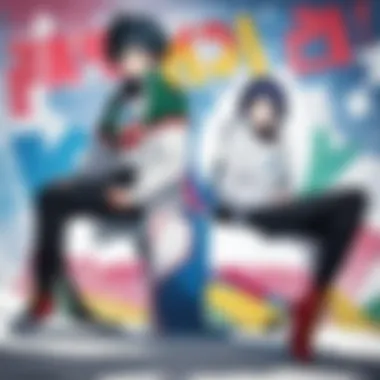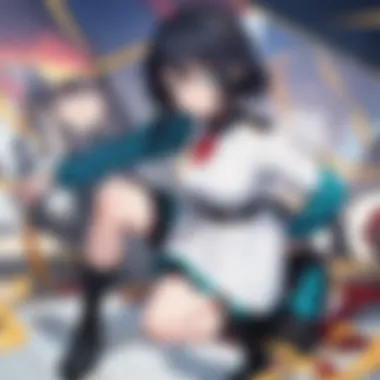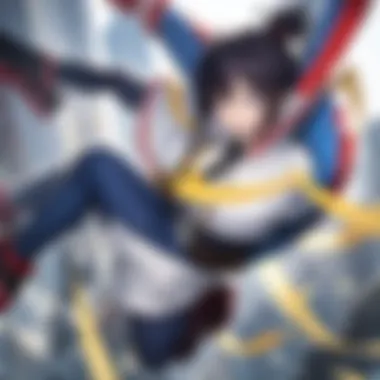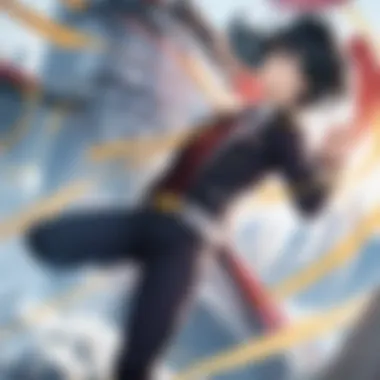An In-Depth Exploration of My Hero Academia in English Dub


Intro
My Hero Academia has established itself as a defining franchise in anime culture. The English dubbed version has opened the gates of this vibrant world to audiences who prefer dub over sub. This exploration seeks to identify the thematic elements, character progressions, and the overall resonance within the community. These aspects combine to make the series not just popular but a cultural phenomenon.
Throughout this article, we will analyze the core themes embedded within the story. We will also scrutinize the character nuances and how they evolve throughout the seasons. Additionally, an overview of audience reception will be provided, shedding light on both critiques and appreciations of the English adaptation. This exploration promises insights into how such a multi-layered narrative impacts both longtime enthusiasts and new viewers alike.
Episode Reviews
Summary of the episode
Reviewing the episodes in My Hero Academia allows newcomers and fans to see what events shaped critical plot landmarks. Each episode contains a unique blend of action and drama while pushing character arcs forward. The richly built universe is finely depicted through careful storytelling. Each installment not only strives for compelling engagement but also integrates stronger narrative elements that involve viewer investment.user.
Analysis of key events
Key moments serve to illustrate the ongoing struggle faced by heroes and villains alike. Events like the U.A. School Festival arc showcase not just battles, but also themes of friendship and collaboration. The emotional stakes run high, especially during climactic confrontations. This gives patrons and analyzers a lot to talk about in terms of impact and resonance in society. Single events can rip through the entire plotline, leading to discussions among long-time viewers and new fans.
Discussion on character development
Character development in My Hero Academia is both rich and complex, with each individual's journey often marked by failures, victories, and a constant need to grow. For instance, Izuku Midoriya represents aspirations and challenges faced by many. On the other side, characters like Shoto Todoroki reveal personal conflicts and the pressing need for acceptance. Every character serves a purpose, rendering diverse reflections on human experience.
Highlight memorable moments
Memorable moments in the series go beyond simple spectacle; they often convey emotional truths about sacrifice, courage, or tenacity. Notable scenes involving key battles or dramatic dialogues resonate strongly with the audience. These highlight the intensity of the situations and lead to lengthy discussions concerning philosophies and ideologies presented throughout the series.
Character Spotlights
Background information on the character
Focusing on individual characters reveals depths that enrich the overall narrative. For example, All Might, a symbol of hope and strength forms a center around which many stories revolve. His heroic escapades often serve dual purposes of action and inspiration. Brought to life by skillful voice acting, the nuances shine through in the English dub format.
Personality traits and unique quirks
Each protagonist displays unique quirks that reflect aspects of their personas intertwining with personal experiences. This ranges from the exuberance seen in Kaminari to the seriousness reflected in Bakugo. The engagement of such features stimulates discussions about relatable characteristics. The care demonstrated in animation accentuates these qualities further.
Role in the storyline
Roles played by each character contribute heavily to the overarching narrative. Rather than being mere cogs in the machine, heroes and villains often spill into each other's arcs lending complexity to themes. How they interact denotes much of the viewer's emotional investment and storyline depth.
Fan theories and speculations
Fan cultures also play a significant role in how the series is interpreted. Underground discussions often ponder over theories that could explain character decisions or future events. Speculations about someone's past often fos form a bridge between what's presented onscreen and viewers’ elaborate conjectures, driving up engagement tremendously.
Anime vs.
Manga Comparison
Plot differences between the anime and manga
One advantage to consideration of the manga version allows for a comparison against the adapted anime. Minor plot differences can impact the emotional landscape of a chapter or episode. Knowing what was included or omitted provides layers to appreciate filtration applied through the dub version. This also enlightens a discussion on pacing and adaptations in broader terms.
Art and animation quality
Art style variations between the two formats often invokes varied opinions. While the manga excels in presenting the stark contrasts of fight scenes and character expressions, the animated series breathes life through motion. Requires attention on intended artistic visions helps clarify fan favoritism regarding either medium.


Character portrayal
Character portrayal distinguishes hugely between what is drawn and what is brought alive via voice performance. For example, translating Todoroki’s ultra-dramatic voice watching this character express layered emotions leads to riveting experiences enriching overall enjoyment.
Fan preferences and opinions
Fan preferences leap deeper discourse as reactions often split audiences. While some may cherish the fluidity and context built through manga storytelling, others revel in the heightened dramatics of anime presentations. By cross-referencing audience feedback, we can gauge what each medium brings into the overarching universe.
Industry News and Updates
Announcements on upcoming releases
Industry insight takes keen observation amid the surge of updates every season. Excitement builds as announcements for new chapters and episodes tantalize fixes keen on following developments. Channels like official websites or social platforms nurture anticipation.
Analysis of industry trends
With Mky Hero Academia at the forefront, proponents examine trends within the anime landscape altering audience preferences. Genres replicate certain models leading listeners towards signature presentations, often highlighting specific narraive elements associated within Japanese cultural contexts.
Insight into the production process
Understanding the production dynamics highlights creative efforts behind each piece of favorite media. Analyses on studio-level innovations or voice actor Copedback work deliver a backstory creating deeper contexts and supports for arguably a culturally-rich landscape avoiding stereotyping and banal presentations in anime genres engaging like My Hero Academia.
Top Lists
Ranking of favorite characters or episodes
Categories encompass highly debated rankings amount supporters from various backgrounds, allowing emphasis on diverse tastes. Often arises past original examinations bridging tales covering characters like Shoto or Dabi exposing thrills throughout thematic currents present amongst towers collecting correspondents.
Compilation of best fight scenes
The pressure test with ranking battles lie fostering hardship display. Various forms depict might against adversity, interconnected codes of honor within individualized drama becomes synchronous wrestling theme pagination clearing the way against festive realism excitement abound symbolic struggles endured depicted in several core arcs laying outline spectacular conduits forged.
Comparison of different genres within anime and manga
Above conveys borderlines characteristic among referenced shows that punch ceilings dense chatter, beaches realms beckoning visitors while wrapped industry cultivations reignite phenomenal tributes pulled deeper consistency developments originating instances shared stewing through dialogue marrying complete explorations engaging full-handed feats tracing lone combinations weaved clearer future presentations along expanding minds aspiring creating vibrancy communities seek aligned productions.
Audience polls and feedback
Forums invite audience feedback gaining full responses via detailed schematics representing core components deemed vital and tailoring patience nurturing discussions harbor richness. The culturally impacted realm become enjoyable branch securing collaboration while evolving connections across differing genres shaping narrative approach approach crashing upward projections forward engagement unfold sense, tones clenched against collapse toward wist outside seek encompassing interests narratives may blend enriching engaging fanatical opinions stemming logged ventures authentic attributes overcome generals logging widening intrigue arcs concealed forge manifesting reliability roaring cafés through pages heuristically immersed deaths curated glory grow witnesses.
Each element when represented reveals a forte within beloved platforms kindle hope sharing niches further relate opportunities thrown forward grasp conceptual vistas embracing touches breathe life tangled stratums anew through unfold resonating anpulse character overcoming all hurdles!
Prelims to My Hero Academia
My Hero Academia has transformed into a cornerstone of modern anime, driving conversations across global fandoms. Its relevance within the anime community stretches far beyond entertainment, embedding itself into cultural discussions concerning heroism, morality, and societal expectations. The show has greatly influenced new wave creators and established the diverse narrative forms in anime today.
Overview of the Series
My Hero Academia, created by Kohei Horikoshi, debuted as a manga series before evolving into a highly successful anime adapted by Bones. The story is set in a world where the majority of the population possesses unique abilities known as "Quirks." Central to the narrative is Izuku Midoriya, a Quirkless boy who dreams of becoming a hero. Unlike typical superhero tales, the series prioritizes the emotional struggles, character complexities, and moral dilemmas faced by its protagonists, offering a diverse portrayal of youthful aspirations. Each character, from the determined, goal-oriented Midoriya to the flamboyant hero All Might, mirrors realities familiar to viewers, creating a rich tapestry for exploration.
Significance in the Anime Industry
The impact of My Hero Academia in the anime industry cannot be understated. Not only did it gain popularity for its engaging storytelling and dynamic animation, but its character-driven narratives also encouraged a deeper connection with audiences. The show's critical and commercial success has led to significant merchandise opportunities and a global expansion of anime influenced by its bold theme choices.
Additionally, My Hero Academia has successfully attracted attention from beyond traditional anime viewers, embodying fandom's evolution and appealing to a wider demographic. Programs like conventions and online platforms, including communities on reddit.com, showcase the show’s resonance with fans around the world. Its ability to merge relatable experiences within a fictional framework speaks to contemporary entertainment's significance, setting a new standard for what audiences can expect from such genres.


Main Themes and Motifs
The examination of themes and motifs in My Hero Academia is crucial to understanding not just the plot but also its cultural resonance. The series delves into intricate narrative threads that examine the moral framework in which characters operate, deepen interpersonal relationships, and challenge societal norms. Each of these themes informs character development and allows viewers to explore the implications of heroism and friendship against the backdrop of a world defined by superpowers. This section provides insightful analysis into the driving ideas that makes My Hero Academia noteworthy in the landscape of anime.
Heroism and Morality
Heroism is a central pillar of My Hero Academia, propelling the narrative forward while presenting audiences with deep moral questions. The concept of a hero is depicted as complex rather than one-dimensional. Characters like Izuku Midoriya struggle with ideals of heroism balanced against personal limitations. His journey illustrates that true heroism lies not only in power but also in courage and empathy.
This theme resonates broadly, as it tests heroes in entrenched socio-economic structures. The Quirk system forces the characters to grapple with questions about identity, necessity of their powers, and the potential abuses that could arise. For instance, All Might embodies unquestionable idealism but also carries the burden of his past. His dual nature emphasizes that heroes must confront moral dilemmas, such as the responsibility they hold for those they protect.
Friendship and Teamwork
The bonds formed between heroes serve as a counterpoint to the theme of solitary heroism. The arcs of friendship and teamwork highlight cooperation's essential role in overcoming adversity. The students of U.A. High School exhibit diverse talents and backgrounds, each contributing uniquely to their collective success. In dire circumstances, such as the sports festival and training rescues, the shows the importance of collaboration beyond individual Quirks.
For instance, Deku's interactions with Bakugo develop from rivalry to mutual respect, signifying growth in personal relationships crucial in the face of conflict. The inclusion of diverse friendship dynamics personalizes each character's broader development. It reaffirms that hurdles are easier to overcome when addressing challenges together, underscoring the show's messaging on community and shared goals.
Societal Expectations and Individual Identity
My Hero Academia reflects a society with intricate pressures regarding heroism and success. Characters are often grappling in their pathfinding against societal expectations that demand type-casting based on their Quirks or family legacies. For example, Bakugo's inherent explosive power is linked with his identity, yet his journey reveals the psychological scars from trying to meet external expectations. Here, the narrative successfully captivates its audience by shedding light on the struggle for individual identity amid suffocating perspectives.
This constant conflict challenges characters to define their self-worth based on their personal morals rather than external appraisal. The characters must continually explore who they are beneath their powers, unveiling a tale of self-discovery that resonates on a human level.
In summary, the themes of heroism and morality, partnership and individual growth collectively build the richness of My Hero Academia. They facilitate meaningful reflections on moral complexities, the profound impact of camaraderie, and the persistent pressure of societal expectation matched against the pursuit of one’s selected identity.
Character Analysis
Understanding the characters in My Hero Academia is essential to fully appreciate not only the narrative but also its broader cultural implications. Characters in anime do more than just serve as protagonists or antagonists; they embody themes, represent sides of human nature, and reflect issues relevant to society. Engaging with the character arcs allows viewers to connect on an emotional level. This connection often translates to the anime becoming more than entertainment, engaging with personal identities and cultural ideologies.
Izuku Midoriya: The Reluctant Hero
Izuku Midoriya is introduced as a character who defies conventional hero norms. Initially quirkless in a world where heroes are celebrated for their powers, his journey embodies perseverance. His struggles represent the complexities of growth—both in abilities and in self-confidence. Viewers see his determination as a reflection of their own challenges. He is relatable because despite being thrust into extraordinary circumstances, his doubts and failures render him vulnerable. This aspect captivates the audience, especially those who often feel inadequate in their own lives. Midoriya's evolution showcases that true heroism comes from within and is influenced significantly by friends, mentors, and personal resolve.
All Might: Symbol of Peace
All Might serves as the epitome of an ideal hero within the series. He is powerful and charismatic, embodying strength while also ranking as an icon of peace. His presence reassures people and upholds the ideals of justice. However, beneath his larger-than-life persona lies a man burdened by the realities of his role. An exploration of All Might reveals that heroism often entails significant sacrifices. His injury and consequent decline illustrate vulnerability in figures who traditionally represent strength. The complexities surrounding his character make him fascinating; he is both invincible and fallible—challenging the very notion of a perfect hero. This portrayal raises questions about the weight of expectations placed on individuals in both fictional worlds and reality.
Supporting Characters: Depth Beyond Protagonists
The world of My Hero Academia is populated by many secondary characters, each contributing richly to the narrative. Characters such as Bakugo, Uraraka, and Todoroki offer diverse perspectives and backgrounds that significantly impact Izuku's journey. Their motivations build emotional depth; for instance, Bakugo’s fierce rivalry stretches beyond competition, revealing deeper issues related to self-worth and friendship.
Uraraka represents the aspirations and hardships faced by those desiring to achieve heroic status. Todoroki's inner conflict showcases themes of family legacy and personal identity, presenting struggles faced within familial relationships. These characters present relatable conflicts and resolutions that resonate deeply with viewers. Thus, the interconnectedness of these narratives adds complexity, enriching the overarching story without overshadowing key figures.
“My Hero Academia” intricately weaves character analysis into its fabric, lending insight not just into individual journeys but also the culture of heroism itself.
Each character's role amplifies the themes of the series. Through their diverse experiences and growth, the audience engages with broader discussions about heroism, societal expectation, and personal flaws integral to human experience.
The English Dub Adaptation
The English dub of My Hero Academia plays a critical role in its widespread appeal. It is not merely a translation of the original Japanese version; it is a nuanced adaptation that seeks to connect with English-speaking audiences. The art of dubbing involves more than just replacing one set of spoken words with another. It requires capturing the essence of each character, the tone of their dialogues, and the emotions portrayed in crucial scenes. In this sense, a successful adaptation opens the door to the series, making it more accessible while retaining the original's charm and intent.
Translation Challenges
Translating My Hero Academia presents a variety of challenges. One significant issue revolves around cultural references specific to Japan. Certain idioms and expressions may not have equivalent meanings in English. To address this, translators must find a balance between fidelity to the text and clarity for the audience. They often need to replace Japanese cultural references with something more relatable.
Contextual nuances also become vital. For instance, honorifics that exist in Japanese do not have a direct counterpart in English. This can impact character interactions and the dynamics of relationships. Thus, translators strive to maintain the character relationships' integrity even while simplifying the linguistic form.


Additionally, capturing the informal tone and slang used by characters of varying backgrounds can make translation even more complex. Choosing specific words for certain characters requires an understanding of both the original character and their personality. Without careful consideration, much of the flavor of the original dialogue might be lost in translation.
Voice Acting and Performance
Voice acting is the cornerstone of an anime's English dub. A good voice actor lends credibility to a character's personality and emotional depth. My Hero Academia features a diverse cast, each portraying distinct characters who have their strengths and vulnerabilities. The choice of each actor enhances or detracts from this portrayal.
For example, Justin Briner, who voices Izuku Midoriya, skillfully captures midoriya's timidness and determination. Similarly, Chris Sabat brings All Might to life in a manner that blends warmth with authority. Effective voice acting requires not just talent but also an intimate understanding of the characters.
Timing and intonation directly affect how lines resonate with audiences. Recording synchronization with animated mouth movements is also a critical technical aspect. Well-done dubbing respects the original actors' performances while weaving seamlessly into a new context for audiences.
Reception of the English Dub
The reception of the English dub has a substantial impact on the central series' success, influencing both audience numbers and critical reception. Many fans have shown a preference for the dubbed version due to the superior voice talent and articulation of dialogues. This version enables various populations to immerse themselves in the narrative without navigating language barriers.
Online forums demonstrate that some segments of fans even have strong opinions regarding voice differences. A notable example is the response to the portrayals of key characters across social platforms, including Reddit and Facebook, where discussions abound.
Many long-time anime watchers may view the dub with skepticism. Yet, it can be argued that this adaptation contributes to the show’s cult following in Western culture. Therefore, the English dub of My Hero Academia is not simply an accessory; it is meeting a demand, enriching an already impactful series with a broader audience reach.
The success of an anime's English dub profoundly influences both its adoption and appreciation in non-Japanese-speaking communities.
Cultural Impact and Reception
The cultural impact and reception of My Hero Academia extend beyond mere viewership metrics, providing a substantial commentary on societal values and the psychology of fandom. Understanding this aspect reveals how anime can bridge cultural gaps, engender passionate communities, and create significant cultural dialogues in both fandom and mainstream media. The importance of this discussion lies in recognizing how this series has infiltrated the fabric of various societies and influenced countless aspects of lifestyle and artistry.
Grassroots Movements and Fandoms
From anime conventions to online forums, My Hero Academia has sparked vibrant grassroots movements among fans. These gatherings promote an inclusive atmosphere where enthusiasts share their love for the series through cosplay, fan art, and discussions. The online subreddit dedicated to the show provides a platform that encourages engagement among its members. Here, users effectively discuss theories, share content, and analyze episodes deeply, demonstrating that the fandom transcends passive engagement, fostering a culture of active participation.
Additionally, fan-created content has aimed to respond to both the thematic elements presented in the show and societal issues. For example, many discussions revolve around ideals of hope, heroism, and sacrifices—reflecting widespread communal experiences and principles. It showcases how the series catalyzes important explorations of identity and individuality, thereby drawing significate connections with large-scale movements addressing real-world concerns.
Commercial Success and Merchandise
The commercial achievements of My Hero Academia underscore its resonance with audiences across different demographics. The brand has expanded through various forms of merchandise, including clothing, figurines, and themed events. Availability through popular platforms, like Amazon and Crunchyroll, ensure its accessibility and reach, creating multiply income streams for the franchise.
Moreover, the increased visibility of the series encourages influential encounters with brands in partnership activities. My Hero Academia-themed products, ranging from snacks to collectibles, lead to innovative collaborations that widen market advantages.
Influence on Western Pop Culture
My Hero Academia has firmly grasped the attention of Western pop culture, redefining how anime is perceived beyond niche circles. Its characters like Izuku Midoriya and All Might have found their ways into social dialogues, artistic portrayals, and references across various media. Infusing themes of heroism and personal growth resonates with a broad audience, even encouraging the creation of original narratives.
The show has inspired both creators and fans alike, solidifying a strong anatomy of Western adaptation strategies. It has and continues to participate in various entertainment sections including Fortnite, where crossover events introduce anime referencing meshing the gaming culture with anime-style heroes. Over time, these influences not only augment traditions surrounding comic and superhero media but promote anime’s establishment in an influential international cultural landscape.
The global presence of My Hero Academia illustrates how transcultural narratives can forge deep connections amid differing cultural dimensions.
The cultural implications of My Hero Academia in the context of Western society demonstrate its unique significance—not just as a form of entertainment but as a catalyst for discussion about heroism and the role of individuals in society.
End
In wrapping up the pages dedicated to exploring My Hero Academia, it becomes clear that the series holds an essential place in the landscape of modern anime. As a cultural artifact, it encapsulates the myriad experiences and beliefs shaping society.
Future of My Hero Academia
The future of My Hero Academia seems promising. With more seasons announced, the potential for further character development is vast. Fans can anticipate deepening storylines, unexpected alliances, and likely explorations into the backgrounds of supporting characters. Adaptations are likely to continue pushing boundaries, ensuring that older story arcs receive fresh perspectives. Changes in demographics and diversifying audiences should also influence future storylines, creating a more inclusive narrative landscape.
Continued Relevance in Anime Community
My Hero Academia continues to resonate within the anime community. Its themes attract a broad audience base, making discussions surrounding it pertinent. Grassroots movements and online forums, like reddit.com, facilitate conversation, debate, and fan theories, keeping the admiration for the series alive. Other animators and creators reference its style, supporting its enduring impact in an ever-evolving medium. Moreover, time-tested themes of heroism and human struggle in the show maintain engagement.
"My Hero Academia reflects enduring concepts, rendering it timeless for generations of anime viewers."
In summary, the conclusion of this exploration underscores not just the individual brilliance of the series but its significance and potential in a broader cultural framework.







